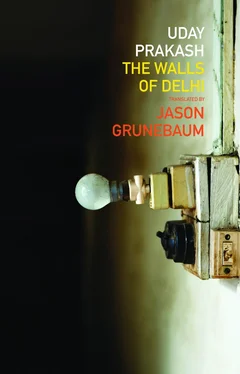One morning at the crack of dawn blind Putlibai was nearly pirouetting in the courtyard, singing with all the joy in her heart:
My boy, his wife, they’ve come to settle down
And so has the little bird myna, in the same room, she’s nested ’round
Call it a holy sign, call it a holy sign, and our troubles will wash away
Jai ho to Goddess Maliha! Success and victory and more
Jai ho to Satguru Maharaj! Victory and success to you
The next week Mohandas waited every day for the letter to arrive from the coal mine. But the postman didn’t come. And then the next week, too — no letter. It was going on three weeks, and by then he’d heard that Santosh Kumar Sharma, son of Kanchan Mal Sharma from Kansakora, was the first to receive his papers. Mohandas caught the state bus service to the coal mine, and was told by the same clerk in the recruitment office that the letters were in the process of being sent out. There were, in fact, only three positions for the five men picked; if no more spots opened up, they’d have to strike two candidates from the list. Mohandas was terrified; the clerk saw the disappointment on his face and tried to reassure him by saying that he hoped that two more positions would open up and even if they didn’t Mohandas’s name still wouldn’t be struck from the list since his had been at the very top.
Mohandas went home. The clerk had told him to wait another six weeks, and had tried to sound as convincing as possible, but Mohandas had already lost a little of his verve. He thought about how Parsu would want his money at the end of the month for the daily milk. In all the excitement, he’d borrowed more money; how was he going to pay it back now? Kasturi told him to keep his resolve. Putlibai promised goddess Maliha whatever she wanted if she saw Mohandas through. And, well, Kaba didn’t say very much; the singing stopped and the cough came back.
Six weeks later Mohandas returned to the Oriental Coal Mines. He waited for a long time before the clerk called him into the recruitment office, where again he told him to wait a little longer. This time he didn’t say for how long, and the bonhomie had faded from his demeanor. Before leaving, Mohandas emphasised that he’d be back again in a month to see if there was anything new; indifferently, the clerk replied, ‘Why bother? If you get the letter, you get the letter.’ Then he added, ‘The truth is that the Coal India manager who chose the candidates that day was from Bihar and gave one of the jobs to his son-in-law. These are the kinds of games the higher-ups play.’ A dark pit opened before Mohandas.
The next month Mohandas went again to see if he could find something out — you never know. He was made to wait outside the office from half past ten in the morning until half past three in the afternoon. After pleading and cajoling with the underling, Mohandas was allowed inside the office, only to discover that the other clerk was on vacation, and that the fat clerk filling in for him knew nothing about his file. Mohandas expressed his concern about the whereabouts of his college transcript and other original documents; by way of an answer, the fat clerk asked what in the world they would do with his transcript and certificates, and added that if Mohandas didn’t get the job, the office would return them by registered mail. Otherwise he could come and pick them up himself the next time he came.
Again Mohandas went home. He knew in his heart of hearts that the gods in the skies had truly sensed his disaster, and had therefore showered drops of mercy onto the dead stump of his existence; the ugly burl had wondrously sprouted shoots and buds, about to burst wide open. But the backdraft of corruption and bad luck had burned it all away. Now no hope remained. If he’d had some cash on hand he could have found a middleman to take it to the top, and secure him the position. The rich in the village were the first to get wind of Mohandas’s situation; just as they’d done before, they started making fun of his education and skills. Mohandas had to swallow the bitter pill of humiliation the day he ran into Vijay Tiwari, son of Pandit Chatradhari, with whom he’d studied at college; and who, even though barely managing to graduate — at the bottom of the class at that — had been set up with a job as a police sub-inspector, thanks to his in-laws’ behind-the-scenes deals. He summoned Mohandas.
‘Moe-huh-naaa! Mo-ha-na! Just the other day I bought three water buffalo as part of a government sponsored program. You see, I’m going to start a dairy. If you play your cards right, you and dear Kasturi can tend to the buffalo, feed them, look after them. You’ll get paid on the first of the month, and I’ll get your house fixed up through the Indira Awas program. And that sweetheart Kasturi shall have a good time in our milk dairy!’
‘Let me think it over,’ Mohandas replied, concealing the insult oozing inside. Hearing the name of Kasturi emerge from Vijay Tiwari’s mouth deepened his feelings of impotence, and gave rise to a new, formless fear. If something weren’t done, and fast, his family would break open and shatter into a thousand pieces. He had to come up with something, anything that was within his power, and something that didn’t require anyone else’s help or connections. Swirling around him were images of Kasturi’s lovely face and Vijay Tiwari’s cunning stare.
He decided then and there that he wouldn’t go back to the Oriental Coal Mines to find out what happened to his diploma, transcript, and the rest of his certificates. Why should he? They weren’t even worth the paper they were printed on. He and people like him didn’t have whatever it was that it took to secure jobs, or to get their hands in the cookie jar of government project funds.
After dinner that night, Mohandas didn’t sleep. He gathered seedlings and a spade, slung everything over his shoulder, told Kasturi he’d be back in the morning, and set off for the banks of the Kathina, and, once there, worked like a spirit possessed to dig irrigation channels for the seedlings of muskmelon, cucumber, watermelon, tomato, and eggplant. At around four thirty in the morning, when all the other stars, one after another, began to fade, but the North Star was still shining with all its lustre, Mohandas wiped the sweat from his forehead and chest and slowly began wading into the waters of the Kathina. Dipping his cupped hands in the water, he scooped the water back over his head, placed his flat palms together in supplication, and said with great emotion, ‘Just please don’t wash away the little plants, Kathinamai. Have mercy on Malihamai, have mercy on my son Devdas. Please don’t gobble up all the crops I planted from the sweat of my brow! Because if you do I’ll jump right in, height of the monsoon, with my kids and all, and fill your stomach with us!’
Tears from his eyes dripped down from his face to swim in the Kathina, where tiny kothari fish swam to the surface and fought to nip at the salt from his teardrops, while Mohandas emerged from the river with Kabirdas’s name on his lips.
When Mohandas got home he found Kasturi busy plastering the courtyard with cowdung, Putlibai sorting by touch the seeds of the muskmelon, cucumber, watermelon in her winnowing basket, Kaba, who had found some shade in the corner, engrossed in husking the bamboo, and eighteen-month-old baby Devdas in his own little world sitting in the middle of the courtyard playing an innocent game of chopping grass with a little cutting tool.
Hearing the sound of his footsteps, Putlibai looked up with her sightless eyes and met Mohandas’s with a smile. ‘Did you hear, Mohana, that mama myna gave birth to two chicks in the myna nest?’
If she’d been able to see she would have been happy to note the look of joy that shone on Mohandas’s face when he heard the news.
Читать дальше










